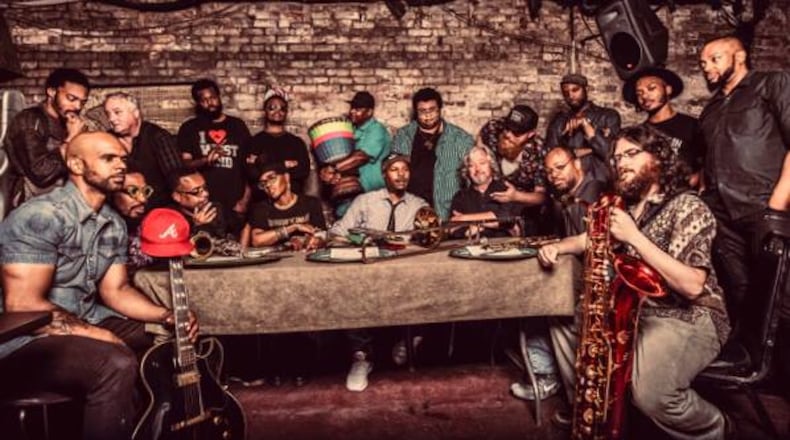Atlantan Russell Gunn and his 26-piece Royal Krunk Jazz Orkestra recapitulated the history of Black people in America in a cinematic 90-minute performance at Symphony Hall Friday, a show that kicked off the Atlanta Jazz Festival.
Called “The Blues and Its People,” the evening-length composition was first presented Feb. 18 at the Apollo Theatre, which commissioned the piece. Friday’s performance was only the second time Gunn’s suite of songs has been presented to an audience.
The composition is a celebration of the seminal study “Blues People: Negro Music in White America,” by social critic and poet Amiri Baraka, and included significant passages from the book, read Friday at the performance with an assured and clarion voice by Atlanta actor Amber Iman.
The book is celebrating its 60th anniversary. Between Iman’s narrated segments were Gunn’s compositions, which took us from work songs to Congo Square dance parties to skittering bebop to Afro-Cuban salsa.
A solemn, slow, three-quarter time processional began the show, with Weedie Braimah, seated front and center, featured on the djembe. Gunn, in gold-embroidered dashiki, entered the stage flanked by a color guard, and before ascending the podium, sipped a ceremonial libation from an attendant cup-bearer.
That slow introduction modulated into James Weldon Johnson’s “Lift Every Voice and Sing,” for which the house lights were raised; the sold-out audience, in an emotional moment, spontaneously rose to its feet to sing along.
After the narrator Iman spoke of the efforts of white enslavers to remove every trace of African heritage from their captives, Gunn’s music evolved into the lament of the field hand, “I’ll be so glad when the sun goes down,” sung with resonance by soloist Leon Timbo.
Vocalist Jazzmeia Horn, in tall golden head wrap, glittered in the next section, scatting fluent lines across a range that reached into the Minnie Riperton stratosphere. Vocalist Miles Griffith answered with growled syllables and strangulated cries.
“The spirit will not descend without song,” announced Iman, in a section devoted to the Black church. At this point the projections on the screen behind the orchestra shifted from geometric patterns to images of the famous stained glass window at the 16th Street Baptist Church, donated by the people of Wales after domestic terrorists bombed the church and killed four young girls.
The orchestra plunged into a second-line fantasy next, the happiest section of the evening, during which Gunn and Horn both took up tambourines.
Gunn’s orchestra included trumpets, trombones, saxophones, violins, cello, piano, bass, drums, percussion and a host of extras, including spoken word artist Jessica Care Moore and Warren Wolf on vibraphone.
The sound and balance were handled well, although the vibes, as is often the case, were under-amplified. Despite that tiny shortcoming, it was a remarkable evening of music and message.
The Atlanta Jazz Festival, a free outdoor event held at Piedmont Park, continues Monday. Go to The Atlanta Jazz Festival for more information.
About the Author
The Latest
Featured



